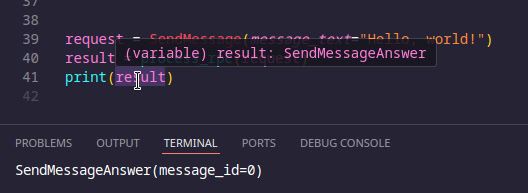Python Generic Return Types
Motivation
While working with the now-deprecated MTProto library Pyrogram, I encountered a situation where I had to manually type hint the RPC calls’ result types.
from pyrogram import Client
from pyrogram.raw.types import DialogFilter
from pyrogram.raw.functions.messages import GetDialogFilters
app = Client(...)
...
folders: list[DialogFilter] = await app.invoke(GetDialogFilters())It wasn’t a big deal and I didn’t think much of it, I just accepted it as something I had to do to improve the quality of my code and make Mypy errors disappear.
That is, until I switched to the gramme.rs Rust library. I noticed that rust-analyzer could automatically detect the RPC return type without me specifying it, so I dug deeper.
By looking at the source code of the library on docs.rs (code permalink. warning: huge webpage), I could find this snippet of code:
#[derive(Debug)]
#[derive(Clone, PartialEq)]
pub struct GetDialogFilters {
}
impl crate::Identifiable for GetDialogFilters {
const CONSTRUCTOR_ID: u32 = 4023684233;
}
impl crate::Serializable for GetDialogFilters {
fn serialize(&self, buf: &mut impl Extend<u8>) {
use crate::Identifiable;
Self::CONSTRUCTOR_ID.serialize(buf);
}
}
impl crate::RemoteCall for GetDialogFilters {
type Return = crate::enums::messages::DialogFilters;
}That’s clever! It’s a statically defined return type bound to the RPC call struct. Let’s replicate this pattern in Python.
Note: the Rust code uses a
DialogFilterstype instead of alist[DialogFilter], my snippet comes from an older version of the library. The newer version of the protocol uses aDialogFilterstype, which is a list ofDialogFilterobjects with additional metadata. TheDialogFiltertype is a simple object with a few attributes, so it is not relevant to the purpose of this post.
Minimal Implementation
from typing import Any, Generic, Protocol, TypeVar
R = TypeVar("R")
class HasResult(Protocol, Generic[R]):
result: R
T = TypeVar("T", bound=HasResult[Any])
def process(obj: HasResult[R]) -> R:
return obj.result
class ExampleResult:
def __init__(self, value: int):
self.result = value
example = ExampleResult(42)
result = process(example)This is a minimal snippet I came up with. As you can see, the linter can correctly detect the type statically.

While this snippet is fine for most use cases, I wanted to replicate the design pattern more accurately.
Advanced Implementation
from dataclasses import dataclass
from typing import Any, Generic, Protocol, TypeVar, Type
D = TypeVar("D", covariant=True)
R = TypeVar("R", bound="HasDefault[Any]")
class HasDefault(Protocol, Generic[D]):
@classmethod
def default(cls) -> D:
...
class HasResult(Protocol, Generic[R]):
result_type: Type[R]
@dataclass
class SendMessageAnswer:
message_id: int
@classmethod
def default(cls) -> "SendMessageAnswer":
return cls(message_id=0)
class SendMessage:
result_type = SendMessageAnswer
def __init__(self, *, message_text: str):
self.message_text = message_text
def process_rpc(obj: HasResult[R]) -> R:
return obj.result_type.default()
request = SendMessage(message_text="Hello, world!")
result = process_rpc(request)
print(result)Notable changes:
result_typeis now aType[R]to prevent situations like this:# Wrong class SendMessage: result_type: SendMessageAnswer # Correct (notice the `=` sign instead of `:`) class SendMessage: result_type = SendMessageAnswerAdded a
.default()method interface for the sake of demonstration, but in real code this could be a.deserialize(stream)method that takes a binary data stream (MTProto is a binary protocol) and deserializes it into the expected object.

Conclusion
This is a simple way to implement generic return types in Python. It is not as powerful as Rust’s type system, but it is a good compromise for Python’s dynamic nature. For more information on the Protocol class, check out the python documentation.
I have a feeling that there could be a better way to implement this, but I haven’t investigated it yet. I will update this post accordingly if I will manage to find a better solution.